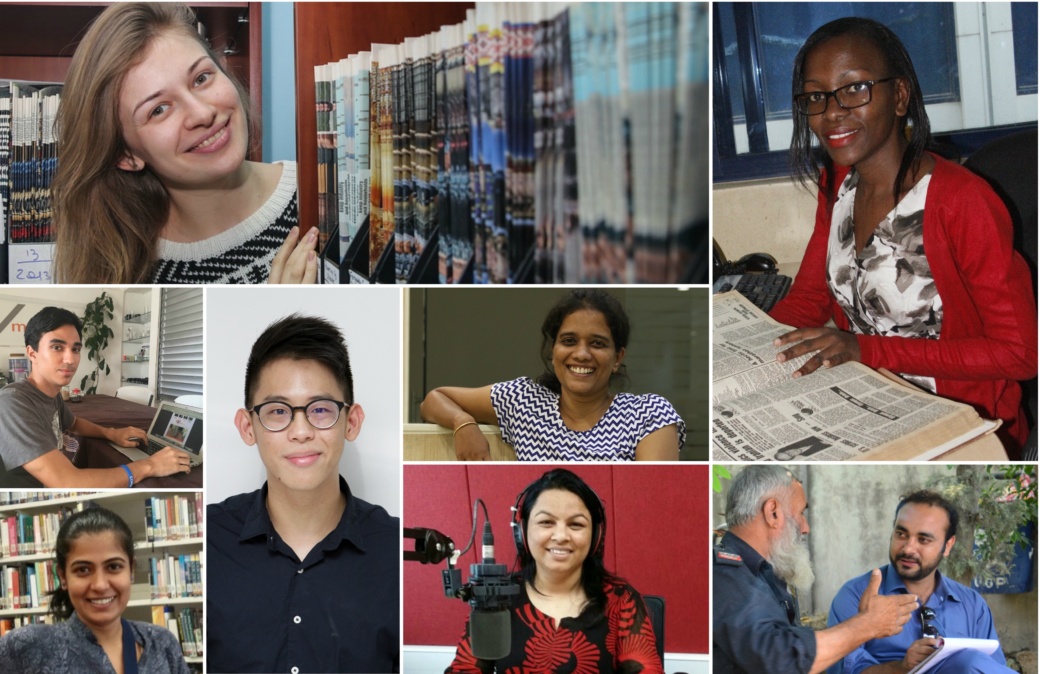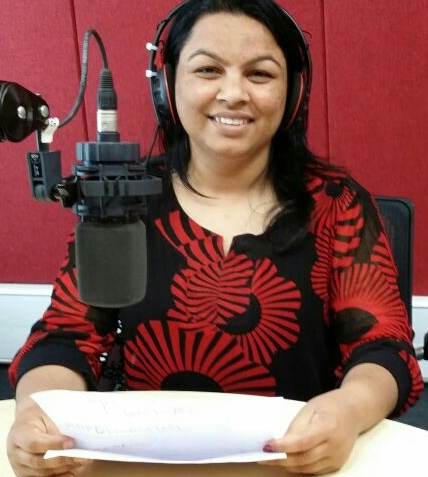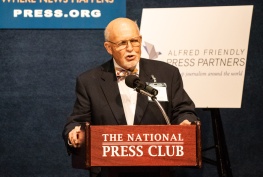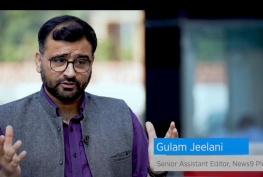 The Class of 2017, clockwise from top left: Yuliana Romanyshyn, Kyiv Post, Ukraine, going to the Missourian in Columbia and the Chicago Tribune; Ashley Lime, The Standard, Kenya, going to the St. Louis Post-Dispatch; Salman Yousafzai, The Frontier Post, Pakistan, Minneapolis Star-Tribune; Binita Dahal, BBC Nepali Service, Kansas City Public Television; Nicholas Cheng, (in glasses) The Star, Malaysia, San Francisco Chronicle and Los Angeles Times; Veengas Yasmeen, Daily Ibrat, Pakistan, training fellow; Teo Escobar, 14ymedio, The New Tropic in Miami; and in the center, Smitha Rajan, Daily News & Analysis, India, Politifact and The Washington Post.
The Class of 2017, clockwise from top left: Yuliana Romanyshyn, Kyiv Post, Ukraine, going to the Missourian in Columbia and the Chicago Tribune; Ashley Lime, The Standard, Kenya, going to the St. Louis Post-Dispatch; Salman Yousafzai, The Frontier Post, Pakistan, Minneapolis Star-Tribune; Binita Dahal, BBC Nepali Service, Kansas City Public Television; Nicholas Cheng, (in glasses) The Star, Malaysia, San Francisco Chronicle and Los Angeles Times; Veengas Yasmeen, Daily Ibrat, Pakistan, training fellow; Teo Escobar, 14ymedio, The New Tropic in Miami; and in the center, Smitha Rajan, Daily News & Analysis, India, Politifact and The Washington Post.
By Maria José Valero and David Reed
The eight reporters and editors joining the Alfred Friendly fellowship program beginning March 16 have covered wars, terrorist attacks, disasters, social conflicts and corruption scandals, and they’ve practiced enterprising journalism despite repression and censorship.
“Here, in Peshawar, due to many social, cultural, political pressures and due to threats to life very few journalists dare to write the truth”
The Fellows — from Malaysia, Nepal, India, Pakistan, Kenya, Ukraine and Cuba — will spend six months getting hands-on experience and leadership skills they’ll need to become more effective journalists and to make a profound impact in their home newsrooms.
The 2017 Fellows will train at the Missouri School of Journalism and work for five months for a diverse group of media outlets across the country, from newspapers in San Francisco, Minneapolis and Chicago to the fact-checking website Politifact and the public television station in Kansas City.
Salman Yousafzai, a reporter for the Frontier Post, is one of the few journalists covering crime and terrorism in the Khyber Pakhtunkhwa province and the Federally Administered Tribal Areas of Pakistan who has developed sources with both militant groups and government security forces.
“Here, in Peshawar, due to many social, cultural, political pressures and due to threats to life very few journalists dare to write the truth,” wrote Yousafzai, a Daniel Pearl Foundation Fellow who will work at the Minneapolis Star-Tribune.
“There is an unexplainable electricity I feel when chasing a story”
Yousafzai, who contributes investigative reports to the Dawn news website, also has written about the thriving meth addiction in his coverage area and contraband smugglers who are financing terrorism in Pakistan.
Another Daniel Pearl Fellow, Nicholas Cheng, learned a harsh lesson about media repression in his country when he broke a story related to a state investment fund scandal linked to the president. Police detained him for questioning and seized his computer. But his editor wrote in his application that Cheng “took the incident in stride and was not deterred.”
Cheng writes for The Star, Malaysia’s largest English daily, and will work for the San Francisco Chronicle and the Los Angeles Times during the six-month fellowship. “There is an unexplainable electricity I feel when chasing a story,” Cheng wrote, while explaining why he decided to become a journalist when his parents were pushing him to become ar physician. “The understanding that journalists can truly, genuinely make a difference was enough for me.”
Yuliana Romanyshyn, who will work at the Columbia Missourian and the Chicago Tribune, was inspired by the EuroMaidan Revolution and the war in eastern Ukraine to to become a reporter for the Kyiv Post, where she has written stories about the impact of the fighting. “I could not stand aside” during these tragic events, she wrote. “Now, I have the opportunity to bring up an issue to an international audience, deliver it to politicians and civil society, and make a difference. Romanyshyn primarily writes about business activity in Ukraine. “In this field I can really make a difference with the new investors coming to Ukraine in spite of war and economic decline.”
Binita Dahal, the inaugural Patrick and Janna Stueve Foundation Fellow, also stepped up to make a difference at her radio station in Kathmandu. Dahal was freelancing for the BBC Nepali Service two years ago when the massive earthquake struck Nepal and she was asked to lead the launch of a public service channel to help victims. The text messaging Viber app delivered vital information in Nepali and English for relief and rescue services. Dahal is now a correspondent and producer for the BBC.
Dahal, who earned a law degree along with bachelor’s and master’s degrees before becoming a journalist, is also having a positive impact in Nepal through her columns on legal issues for the Nepali Times.
“Her interest in law made her an expert in covering the Supreme Court, which has become a pivotal institution in safeguarding democracy and the rule of law during Nepal’s fragile political transition,” said Kunda Dixit, who is Dahal’s editor at the English language weekly, her mentor and, when she was in journalism school, one of her teachers.
Dahal said her exclusive news report on a former member of parliament’s involvement in a wartime murder case “led to nationwide discussion on transitional justice and the truth and reconciliation process in the country.”
“She is among the few female journalists from rural Sindh province in Pakistan who have braved the cultural and social odds of their conservative society to persist in their passion for media freedoms, women’s rights and human liberties”
Veengas Yasmeen, a columnist and a sub-editor at the Daily Ibrat, has made an impact in Pakistan through her reporting on forced religious conversion and sex slavery of non-Muslim girls; the Sindh government passed legislation against those practices, but later rescinded the bill because of opposition by religious parties.
“She is among the few female journalists from rural Sindh province in Pakistan who have braved the cultural and social odds of their conservative society to persist in their passion for media freedoms, women’s rights and human liberties,” her editor, Najam Sethi, wrote.
Veengas will participate in the initial fellowship training, a trip funded by members of the Association of Physicians of Pakistani Descent of North American.
Smitha Rajan, the inaugural Frank Islam & Debbie Driesman Foundation Fellow, has examined difficult health and environmental issues while reporting for the Daily News & Analysis (DNA) in Ahmedabad, India.
She’s written stories on a swine flu outbreak and the state’s poor handling of it, and stories that brought to light the environmental and human costs of Gujarat’s development. One example was an article about villages where men find it difficult to attract brides from outside areas because of rampant pollution in their villages. Rajan has also taken up issues that highlight the plight of the Dalits, the lowest in the Hindu Caste system.
“As I progressed, I got my own team to lead and that is when I found myself handicapped by lack of formal training in journalism,” Rajan wrote. “I would like to use this fellowship opportunity to learn how journalists and newsrooms in the U.S. are battling increased government and corporate control, reduced budgets and onslaught of digital journalism to be stronger and bolder.”
Ashley Lime, the editor in charge of foreign news for The Standard newspaper in Kenya, said journalists in her country also need more training, and she intends to use the skills and experience from the fellowship to improve her newsroom.
Lime, who will work at the St. Louis Post-Dispatch, oversaw coverage of the U.S. presidential race last year and was named the Standard Group’s best sub-editor the year before. As a reporter, she covered a variety of significant topics, including activities of the al Shabaab terrorist group, refugee problems and deadly diseases.
The journalists chosen for the 2017 fellowship administered by Alfred Friendly Press Partners come from countries where watchdog journalism is widely censured and sometimes dangerous.
Half of the countries represented in the fellowship are declared Not Free by the Freedom House’s Freedom of the Press report, the other half is considered Partly Free.
For the second year in a row, the Alfred Friendly fellowship is welcoming a journalist from Cuba — a country labeled “worst of the worst” in terms of press freedom by Freedom House. The 2017 Fellow from Cuba, funded by the Friendly Family, is Teo Escobar. He works for 14ymedio, the first independent digital media outlet in Cuba. Teo wrote for The New Tropic in Miami last year during an ICFJ workshop. His story topics included a dissident Cuban rapper, pollution in Lake Okeechobee and what Cubans thought of the U.S. presidential election. He’ll rejoin The New Tropic during the fellowship.
“I feel I have not had the luxury of proper training or to learn from the industries overseas”
The weighted average of the Freedom House score of the countries represented in these fellowships is 61 over 100, the latter being the worst score. The outliers are Cuba with a score of 91, and India with a score of 41.
In addition to repressive laws and censorship, journalists in Malaysia deal with a lack resources. “I feel I have not had the luxury of proper training or to learn from the industries overseas, and end up producing stories that do not wholly inform the Malaysian public,” Cheng wrote.
The conditions a journalist endures in countries like Pakistan and Malaysia are not the only hindrance reporters are worried about. Journalists are also facing the digital disruption. Incoming Fellows have expressed their desire to learn about new media and how to finance it in order to make successful transitions in their newsrooms.
Rajan is eager to learn how American media has adjusted to “reduced budgets and [the] onslaught of digital journalism.”
The fellows will work in newsrooms that are innovating and now have years of experience in producing digital content.





